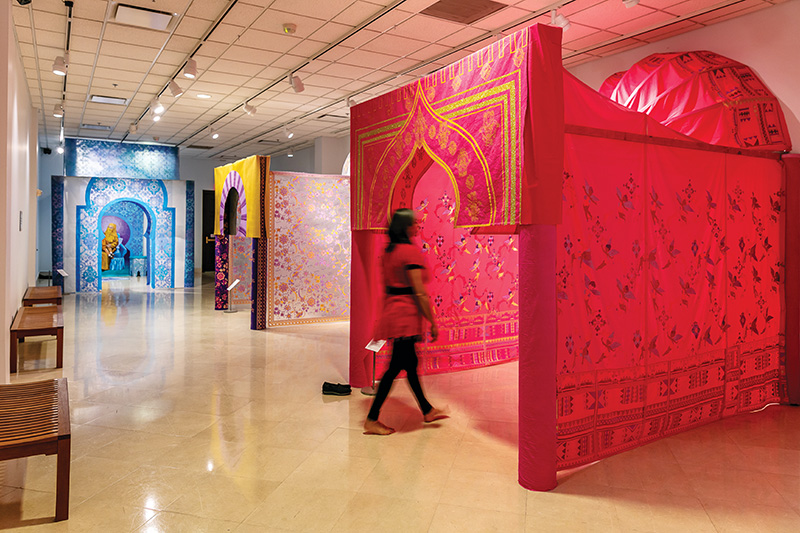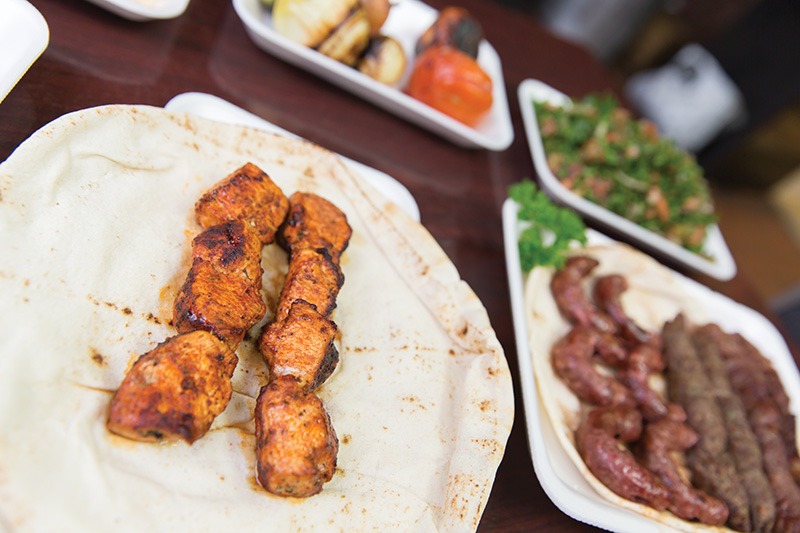Michigan is celebrated for having one of the most vibrant Arab communities in the U.S. In fact, metro Detroit’s Arab population is among the largest outside the Middle East itself, and while Dearborn is undoubtedly the heart of local Middle Eastern culture, communities have also blossomed in West Bloomfield, Troy, Hamtramck, and beyond.
While people of Arab descent are not officially recognized as a racial or ethnic group in the U.S. Census, estimates place the population in Michigan somewhere between 409,000 and 490,000, according to the website Arab America.
The earliest groups of Lebanese and Syrian merchants began making their way to Detroit in the 1880s, with a much larger influx from these countries, as well as immigrants from Yemen, arriving in the early 20th century to take jobs in the city’s thriving auto industry. Many families began to live in or near Dearborn, which was close to Ford’s River Rouge complex. In more recent decades, immigrants from countries such as Yemen and Syria, which have both experienced widespread civil unrest, have made metro Detroit home.
“Dearborn is home to the largest Middle Eastern population in the U.S., who have definitely left their mark on the area,” says Ali Hachem of Dearborn’s Cheat Treats Cafe, a gourmet cookie and ice cream shop and juice bar. “Specifically, the Middle Eastern cultural value of connecting with loved ones and getting to know strangers over a delicious meal.” That, he explains, is the heart of Arab culture, and there are boundless ways to experience it here if you know where to look.

Don’t Miss
One of the most magical experiences comes during Ramadan, the Islamic holy month that ends with the celebration of Eid. As part of this season, Muslims take time to pray, reflect on their lives, do charity work, and fast from sunrise to sunset. Once the sun sets, families can break their fasts, and they often take to the many authentic eateries in the region to do so. Each year in Dearborn, especially on Warren Avenue on the city’s east side, the streets come alive with families looking for a bite to eat and a chance
to congregate for a moment of celebration. Local businesses and organizers have increasingly banked on this revelry with the creation of all-night food festivals, including a major gathering in the parking lot of the Hyatt Hotel and outside of Cheat Treats. Attendees can sample all manner of food from local vendors. Ramadan starts on
April 12 this year and COVID-19 restrictions might alter the night’s festivities, so check ahead before venturing out.
The Arab American National Museum in Dearborn features an expansive library and resource center with archival research and more than 4,000 books from the Arab community. It’s also home to the annual Arab Film Festival, which takes place each June. Past screenings have seen the likes of the critically lauded dark comedy Dunya’s Day — written and directed by U.S.-based Saudi filmmaker Raed Alsemari — which won a Sundance short film award for international fiction in 2018.
West Bloomfield’s Chaldean Cultural Center, meanwhile, offers a smaller but still robust museum dedicated to Chaldean life. Housed in Shenandoah Country Club, it features a variety of exhibits exploring ancient Mesopotamia, traditional village life, and how Chaldeans have become an integral part of the local community.
The Arab & Chaldean Festival, meanwhile, takes place in Detroit’s Hart Plaza each July. Now in its 50th year, the revered festival spotlights Arab and Chaldean vendors, performances, exhibits, and more. There’s even a fashion show highlighting the best of Middle Eastern clothing from various countries throughout the region. Check arabandchaldeanfestival.com for updates about this year’s festivities.
The Real Deal
A hallmark of experiencing a typical day in many Middle Eastern cities is a trip to the open-air market. Shoppers, of course, can pick up spices and fresh produce, indulge in the many street foods, and haggle with shouting vendors for jewelry and trinkets. But these markets provide a window into the culture as well. You can get a bit of this experience at metro Detroit’s many Arab-owned markets. These businesses aren’t just places of commerce — they help to foster community. West Bloomfield’s Chaldean-owned Babylon Ethnic Foods is known for its wide variety of spices, like torshi, turmeric, caraway, and sumac. Its bulk food section offers an array of dried beans, herbs, and even hibiscus flowers, perfect for making tea. Its hot food bar serves up stuffed grape leaves, hummus, shawarma, and other dishes common on most Middle Eastern menus. Plus, its kitchen serves up tasty Middle Eastern fare to go.
Al-Haramain in Hamtramck is a bastion for international shopping. The supermarket’s founders are a pair of Yemeni business partners who first opened a small produce shop in Dearborn and then relocated to a former dollar store in Hamtramck. Given the city’s diversity of populations from Yemen, Bangladesh, Eastern Europe, and the U.S., the store offers a little something for everyone. The impressive produce section offers jackfruit, yellow mangos, papayas, dates, and other hard-to-find ingredients; its spice section includes everything from cumin to biryani; and its baked goods range from pita and naan
to baklava.
Dearborn Meat Market is a meat-lovers dream. Its entire selection — from beef kafta, makanek sausage, to beef heart — is hand-slaughtered and is delivered three days a week, ensuring freshness. The inventory is also certified halal, i.e. “permissible” in Arabic.
To be considered halal, the animal (beef or chicken) must be slaughtered humanely. Fans of this butcher shop have the option to purchase large cardboard cases full of meat, either raw or freshly prepared in the coal-fired grill that was built in response to demand from hungry fans.

Tastes
On nearly every corner in Dearborn stands an authentic Middle Eastern restaurant. These include Al Ameer, one of the pioneering Lebanese restaurants in metro Detroit and winner of a coveted James Beard America’s Classics award. Its traditional Lebanese maza dish is perfect for a quintessential Lebanese dining experience. Featuring 10 different small plates of vegetables, chicken wings, falafel, hummus, baba ghanoush, tabbouli, fattoush, fried kibbeh, grape leaves, and labneh, its presentation is special in that it’s meant to be spread over an entire table so friends and family can commune for hours at a time and nibble. For coffee, Qahwah House offers a unique experience; its coffee beans are all sourced from the Yemeni family farm of owner Ibrahim Alhasbani. Since it opened a few years ago, Qahwah House has become a destination for Dearborn’s young population, who often gather there to discuss politics.
Speaking of Yemen, head over to Hamtramck for several Yemeni specialties, in particular at Yemen Cafe. This local favorite is known for family-style platters like the fahsah — made with lamb, chicken, or as a vegetarian dish — a rich and nourishing stew that can be sopped up with the restaurant’s saucer-sized pieces of fresh flatbread. Top each bite with a douse of fiery green zhug sauce.
For sweets, Shatila Bakery is a dessert-lovers emporium. First opened in 1979 as a small retail space, Shatila now can be found in Dearborn and West Bloomfield and has become a destination for travelers from all over the country. In addition to its crowd-favorite baklava, Shatila offers a mix of both traditional Lebanese delicacies like knafeh (made with shredded dough pastry stuffed with sweet cream or cheese and topped with sugar syrup) and kashta, (made with rosewater-based sweet cream), as well as European-style pastries like cannoli, fruit tarts, and custom cakes. Another specialty here is Lebanese ice cream (also frequently known as ashta), which has a thicker and more elastic consistency. For a traditional experience, try a cup of kashta pistachio.
One of the most fun things about Dearborn food culture is its many fusions. A growing number of younger generation Arab American restaurateurs are bending the limits of what diners think about when considering the definition of Middle Eastern Food. Zo’s Good Burger is a local pioneer in the halal fancy burger joint genre. Zo’s got its start in 1968 in
a university district in Beirut. When the founder relocated to Michigan in the 1980s, he brought his burger concept with him and opened Good Burger. The restaurant has grown
to include several locations throughout metro Detroit and helped to spur a trend in gourmet burger-making, including at Royale with Cheese in Midtown and Dearborn’s Taystee’s Burgers and Brome Modern Eatery. All of these places use halal beef.
“What makes Dearborn even more special is the blending of Middle Eastern and American cuisine,” Hachem explains, “offering unique and imaginative dishes that are a perfect embodiment of the multicultural society we live in, and that cannot be found anywhere else.”
For his part, Hachem’s Cheat Treats is a fusion of a modern cafe and sweet shop that emphasizes vegan and keto-centric recipes for its cookies, edible cookie dough, and gluten-free cheesecake. The shop also features a juice bar with bottled juices and smoothie bowls. The offerings aren’t what you would call “traditional” Middle Eastern cuisine — instead, they are a reflection of how the culture has evolved stateside.
Did You Know?
One of metro Detroit’s oldest Arab American families first settled in the area in 1885. The Bazzy family continues to thrive, working in medicine and other fields. Their ancestors were some of the first Lebanese immigrants to plant roots in the area, selling fruits and vegetables on trucks.
|
|
|









